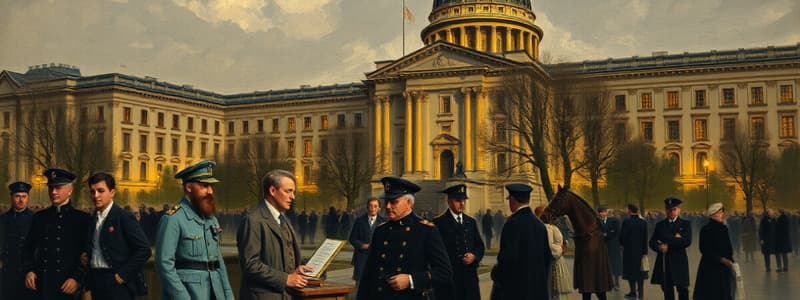Podcast
Questions and Answers
What challenges were faced by the Weimar Republic from 1919 to 1923?
What challenges were faced by the Weimar Republic from 1919 to 1923?
Weaknesses of the Weimar Government and political instability.
What was the voting system used for the Reichstag elections?
What was the voting system used for the Reichstag elections?
- Proportional representation (correct)
- Mixed-member proportional
- First-past-the-post
- Majoritarian representation
The Weimar Government was established before the First World War ended.
The Weimar Government was established before the First World War ended.
False (B)
Who was the leader of the Weimar Government?
Who was the leader of the Weimar Government?
What was one major consequence of the Treaty of Versailles for Germany?
What was one major consequence of the Treaty of Versailles for Germany?
What was Article 48 in the Weimar Constitution?
What was Article 48 in the Weimar Constitution?
What was one reason the German people blamed the Weimar Government after the Treaty of Versailles?
What was one reason the German people blamed the Weimar Government after the Treaty of Versailles?
The _______ Uprising occurred on 6th January 1919.
The _______ Uprising occurred on 6th January 1919.
The German army was reduced to 100,000 men as part of the Treaty of Versailles.
The German army was reduced to 100,000 men as part of the Treaty of Versailles.
What challenges did the Weimar Republic face from 1919 to 1923?
What challenges did the Weimar Republic face from 1919 to 1923?
Who was the leader of the Weimar Government when it was formed?
Who was the leader of the Weimar Government when it was formed?
The Weimar Republic allowed all adults to vote in elections for the Reichstag.
The Weimar Republic allowed all adults to vote in elections for the Reichstag.
What was the voting system used in the Weimar Republic called?
What was the voting system used in the Weimar Republic called?
The head of state in the Weimar Republic was called the ______.
The head of state in the Weimar Republic was called the ______.
What significant power did the President have in emergencies?
What significant power did the President have in emergencies?
What led to political instability in the Weimar Republic?
What led to political instability in the Weimar Republic?
What was the War Guilt Clause?
What was the War Guilt Clause?
Which of the following was a consequence of the Treaty of Versailles for Germany?
Which of the following was a consequence of the Treaty of Versailles for Germany?
The German army was limited to 100,000 men by the Treaty of Versailles.
The German army was limited to 100,000 men by the Treaty of Versailles.
Flashcards are hidden until you start studying
Study Notes
Weimar Republic Challenges (1919-1923)
- Germany transitioned to a republic under Chancellor Ebert post-Abdication of Kaiser Wilhelm II.
- The Weimar Constitution established a democratic government, allowing all adults to vote for the Reichstag.
- Proportional representation in elections led to frequent coalition governments, resulting in political instability and inaction.
- The President, elected every seven years, held significant power, including the ability to legislate without Reichstag consent during emergencies (Article 48).
- Democracy was met with skepticism; many Germans preferred the authoritarian rule of the Kaiser, viewing the new government as weak.
- The Weimar Government relied on military support, entering a deal with the army to ensure mutual backing.
Treaty of Versailles Consequences
- The treaty imposed severe territorial losses on Germany:
- Land ceded to France, Belgium, Denmark, and Poland.
- The Rhineland demilitarized and occupied by Allies.
- Saar coalfields governed by the League of Nations.
- Creation of the 'Polish Corridor' divided Germany from East Prussia.
- The military was restricted to 100,000 troops, six battleships, and no air force.
- Germany accepted war guilt and was obligated to pay £6.6 billion in reparations to France and Belgium.
- Germany was excluded from the League of Nations, perceived as a humiliation by the German populace.
Political Instability Events
- Spartacist Uprising (January 1919): A communist revolt led by Luxembourg and Liebknecht, suppressed by Freikorps; both leaders killed.
- Bavarian Uprising (April 1919): Communist-led overthrow in Bavaria, again repressed by Freikorps.
- Kapp Putsch (March 1920): A right-wing coup initiated by Freikorps leader Ehrhardt and politician Dr. Kapp; attempt to establish a new government met with army non-interference, creating a failed provisional government.
Public Sentiment and Blame
- The Treaty of Versailles was perceived as unjust, prompting widespread anger towards the Weimar Government, labeled "November criminals."
- The populace believed in the “stab-in-the-back” theory, erroneously blaming politicians for loss rather than military failure, exacerbating division and conflict within the country.
Weimar Republic Challenges (1919-1923)
- Germany transitioned to a republic under Chancellor Ebert post-Abdication of Kaiser Wilhelm II.
- The Weimar Constitution established a democratic government, allowing all adults to vote for the Reichstag.
- Proportional representation in elections led to frequent coalition governments, resulting in political instability and inaction.
- The President, elected every seven years, held significant power, including the ability to legislate without Reichstag consent during emergencies (Article 48).
- Democracy was met with skepticism; many Germans preferred the authoritarian rule of the Kaiser, viewing the new government as weak.
- The Weimar Government relied on military support, entering a deal with the army to ensure mutual backing.
Treaty of Versailles Consequences
- The treaty imposed severe territorial losses on Germany:
- Land ceded to France, Belgium, Denmark, and Poland.
- The Rhineland demilitarized and occupied by Allies.
- Saar coalfields governed by the League of Nations.
- Creation of the 'Polish Corridor' divided Germany from East Prussia.
- The military was restricted to 100,000 troops, six battleships, and no air force.
- Germany accepted war guilt and was obligated to pay £6.6 billion in reparations to France and Belgium.
- Germany was excluded from the League of Nations, perceived as a humiliation by the German populace.
Political Instability Events
- Spartacist Uprising (January 1919): A communist revolt led by Luxembourg and Liebknecht, suppressed by Freikorps; both leaders killed.
- Bavarian Uprising (April 1919): Communist-led overthrow in Bavaria, again repressed by Freikorps.
- Kapp Putsch (March 1920): A right-wing coup initiated by Freikorps leader Ehrhardt and politician Dr. Kapp; attempt to establish a new government met with army non-interference, creating a failed provisional government.
Public Sentiment and Blame
- The Treaty of Versailles was perceived as unjust, prompting widespread anger towards the Weimar Government, labeled "November criminals."
- The populace believed in the “stab-in-the-back” theory, erroneously blaming politicians for loss rather than military failure, exacerbating division and conflict within the country.
Studying That Suits You
Use AI to generate personalized quizzes and flashcards to suit your learning preferences.




